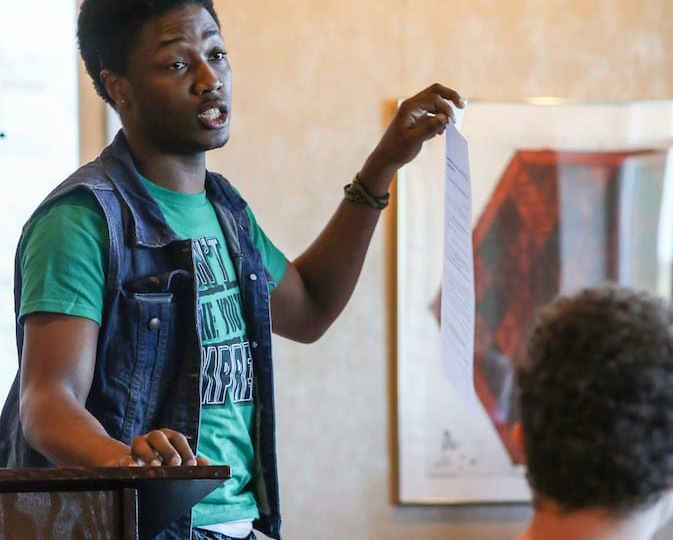
S
t. Olaf has an unfortunate history of anonymous vandalism. Two years ago, a display about Palestine had two flags removed from it, and a poster reading “Death in Gaza” was vandalized to read “Death to Gaza.” Between 2011 and 2013, the rainbow flag in front of the St. Olaf Queer Support and Outreach honor house was stolen approximately five times. Now, another such incident has forced the college to question whether its community is truly inclusive.
In late March, the Gender and Sexuality Center GSC held PGP Awareness Week. PGP stands for “Preferred Gender Pronouns.” These are the pronouns people use to refer to themselves, such as “he/him,” “she/her,” “they/them,” “ze/zir” or “xi/xir.” Over 130 students took pledges to wear buttons inviting people to ask them about their PGPs and raise awareness of gender-neutral pronouns. Students also posted photos of themselves holding signs with their preferred pronouns. These pictures were placed in the hallway to Boe Memorial Chapel, and several were made into posters. The event was tarnished, however, when the photos and posters of students using gender-neutral pronouns, or who were otherwise perceivably transgender, were removed on the last night of the display. The community was alerted to the incident via e-mails sent by Student Government Association SGA President Rachel Palermo ’15 and Vice President Nick Stumo-Langer ’15, and by Rosalyn Eaton-Neeb ’87, Dean of Students, and Greg Kneser, Vice President of Student Life, speaking for the Student Life Office.
Carly Tsuda ’15, a GSC coordinator, explained why the poster incident was damaging.
“Regardless of what the person who removed the photos was trying to accomplish, the message that we received was ‘Non-binary identities aren’t valid.’ This message, coming from our peers, is immensely hurtful to students who are already reminded that so many people feel this way on a day-to-day basis.”
Emery Rankin-Utevsky ’18 agreed. “I was one of the students who was targeted as a visibly trans person, and so my first reaction was fear,” ze said.
“To me, this felt like someone on campus very clearly saying, ‘I don’t want you here.'”
In response, Sustained Dialogues, the new campus group aiming to facilitate communication and confront controversial campus issues, held a discussion on April 13 in Valhalla. People were disappointed with the St. Olaf community, agreed that the act was both passive-aggressive and uncalled for, and talked about ways that the campus could make improvements for transgender students, including the implementation of more gender-neutral bathrooms and gender-neutral housing.
In addition, Gay, Lesbian or Whatever! GLOW! and the GSC held a special discussion during the GLOW! meeting of April 15 to discuss how to respond to acts of aggression and how to support a marginalized community. “The Table” honor house also held a discussion on April 18 to discuss ways to foster a more inclusive community.
Rankin-Utevsky attended the Sustained Dialogues.
“The discussion gave us a chance to talk about the issue and not be talked at,” he said. “My only concern was that the people there likely weren’t people who perpetrated the vandalism, so those weren’t reached. But I think it was important for people who are concerned about this to talk about it. Multiple targets were there and it was good for us to feel supported by the school.”
Kneser explained why Sustained Dialogues are so vital in this era of secret harassment, especially compared to the previous incidents.
“The nature of people doing these things anonymously was frustrating at the time and remains frustrating now,” he said. “But one positive thing now is the presence of the Sustained Dialogues program. We have a mechanism to go to now.”
Tsuda agreed, and praised the overall handling of the situation.
“We really want to reinforce how much positive engagement we had with the week as a whole, and with the responses to this incident. There were so many offers to help, and people trying to think of ways to reach out to the students affected by this,” she said. “Overall, the support has been so great, and we could not have asked for more from campus leadership.”
While there is no way to undo the damage from the vandalism, the St. Olaf community appears to be working together to move forward, make campus more inclusive for everybody and prevent something like this from happening again. Kneser thinks the student body should go one step further.
“The issue of microaggressions is, sadly, a part of life,” he said. “Social media fuels it, and the best way to call it out is for individuals to say ‘knock it off.’ It’s a daily challenge. We often look to other people and institutions to fix it for us, but the best place for us to address it is in our own house.”
walker@stolaf.edu
Photo Credit:MATT TYLUTIKI/MANITOU MESSENGER

